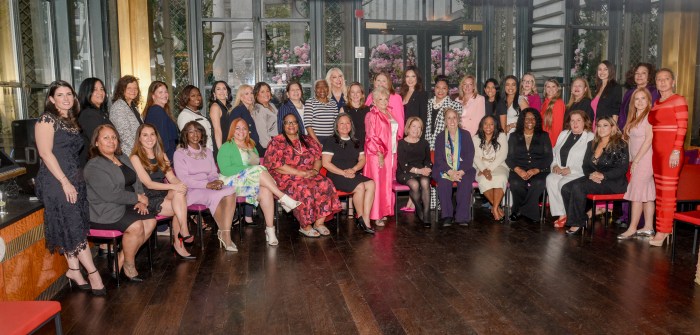By Dustin Brown
Over the past 10 years, the Hispanic population in Ridgewood has skyrocketed by 144 percent, with Hispanics now accounting for one out of every two residents, figures from the 2000 U.S. Census show.
But a community activist organization is worried that the health-care needs of the neighborhood’s Spanish speakers are not being met at Wyckoff Heights Medical Center, a hospital that sits one block from the Ridgewood border in Brooklyn.
Carrying a banner and large placards that decried the hospital’s lack of services for Spanish speakers, a group of about 100 protesters rallied beside the facility on Wyckoff Avenue Feb. 21 to call attention to what they contend is the hospital’s failure to meet immigrants’ needs.
But standing nearby the shouting crowd was William Green, Wyckoff’s vice president of external affairs, who said the hospital has been aggressively addressing the community’s translation needs for years.
“There would be no reason why a person who needed a translator couldn’t get the service,” Green said in a telephone interview Monday.
Andrew Friedman, co-director of Bushwick-based Make the Road by Walking, which sponsored the rally, said the public pressure is meant to get the hospital “to live up to their responsibility under federal, state and city law to make sure their vital health care services are accessible to all community members.”
The group has filed a discrimination complaint with the state attorney general’s office, basing its claim on interviews with 75 Spanish-speaking patients at Wyckoff conducted between September and January.
Of those surveyed, 81 percent said they could not communicate with their doctor because none of the medical personnel spoke Spanish, 87 percent said they were never told about their right to receive free translation services at the hospital, and 68 percent said they were confused about their medical treatment.
The hospital denied the allegations, citing an extensive list of programs and services designed to accommodate the needs of Hispanic patients.
“Do we have as many Spanish-speaking employees that we’d like? No, we do not,” Green said. “It is difficult in nursing, difficult in medical staff, because we don’t have a lot of Hispanics going into medicine or nursing. But we do our best. All of our jobs that we recruit for will say that the ability to speak Spanish is preferred.”
As soon as patients are evaluated they are asked about their English-speaking abilities, Green said.
“Once you are identified as someone who needs assistance, you are provided it,” Green said. “It would make no sense for a doctor or nurse to try to administrate health services to you and they can’t communicate. That doesn’t happen.”
Green said the hospital has put numerous measures in place to meet the needs of its Latino patients. Hospital signs and brochures are printed in Spanish, language classes and cultural sensitivity training are offered to hospital personnel, and a Latino Family Health Symposium is scheduled for April 5.
Both sides claim they have extended an invitation to meet but are waiting for the other party to respond.
Friedman claimed hospital officials were only interested in meeting before the protest to avoid bad publicity but have failed to respond to a meeting request that was delivered in a letter to hospital President Dominick Gio at the demonstration.
“People said we don’t want to help them keep this discrimination a dirty little secret any longer. We want to go public with it,” Friedman said. “It’s been our impression that the hospital is much more interested in public relations than service to the public.”
But Green said he told the group to contact the hospital for a meeting once their protest was over, but he has never heard back from them.
Reach reporter Dustin Brown by e-mail at Timesledger@aol.com or call 229-0300, Ext. 154.































